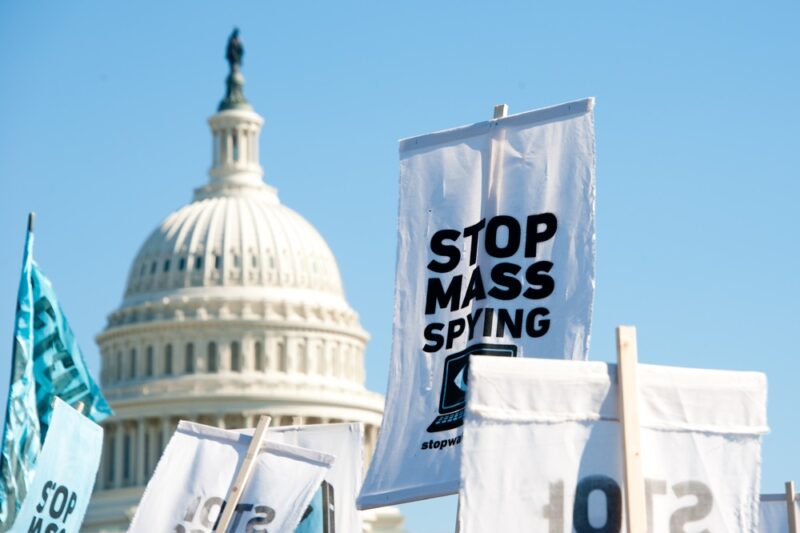
By a 67-32 margin Tuesday, Congress passed the USA Freedom Act — a significant milestone in our efforts to rein in NSA surveillance. The bill marks the first time since passage of the Foreign Intelligence Surveillance Act in 1978 that Congress has taken steps to restrict — rather than expand — the government’s surveillance authority.
To be clear, the bill that passed yesterday is not as strong as we wanted. It is markedly weaker than the original version of the USA Freedom Act that the ACLU first supported in 2013, which itself left many serious surveillance abuses untouched. And while the ACLU was neutral on the version of USA Freedom that ultimately passed, we were a vocal critic of its shortcomings and supported a sunset of the provisions in an effort to advance more comprehensive reform.
Notwithstanding this, however, it is very clear that the USA Freedom Act is a historic step forward.
On the road to its passage, pro-reform advocates beat back efforts led by Senate Majority Leader Mitch McConnell (R-Ky.) to simply extend expiring Patriot Act provisions. A week before the scheduled expiration, he failed to garner enough support for even a one-day extension. Opposition came from many within his own party, with senator after senator taking the floor in support of reforming surveillance laws.
When gridlock resulted in a temporary sunset of the provisions, a majority of the Senate again refused to accede to efforts to water down the USA Freedom Act or extend the provisions.
Such defeats would have been unthinkable just a couple of years ago. They demonstrate that the post-9/11 panic, in which members of Congress and the public were willing to sacrifice civil liberties in the face of nebulous national security claims, is fading.
Rep. John Conyers (D-Wis.) and Sens. Patrick Leahy (D-Vt.) and Ron Wyden (D-Ore.), who were once lone voices expressing concern over the Patriot Act, have now been joined by a broad coalition, including Rep. Jim Sensenbrenner (R-Ill.) and Sens. Mike Lee (R-Utah) and Al Franken (D-Minn.), among others. For nearly two years, this coalition crafted and shepherded the USA Freedom Act through Congress, ignoring the calls to abandon surveillance reform in the face of ever more heated national security rhetoric around ISIS.
At the same time, a new technologically savvy generation is that unchecked intelligence agencies threaten technological progress, the economy, and the global free flow of ideas. They are overwhelmingly supportive of a new era in which intelligence practices comport with America’s democratic values.
The USA Freedom Act, we hope, is only the beginning of this new era. The coalition that helped to advance the USA Freedom Act must now work to advance additional reforms. This includes:
- Urging both the president and Congress to rein in surveillance under Executive Order 12333, which has been used to collect information about millions of Americans absent any judicial process
- Reforming Section 702 of the Foreign Intelligence Surveillance Act (set to expire in 2017), which allows the government to collect the content of Americans’ communications with individuals abroad
- Reforming other authorities, such as the administrative subpoena statutes, which have been used for bulk collection in the past
- Further reforming the authorities addressed in the USA Freedom Act, including Section 215, FISA’s pen-register and trap-and-trace provisions, and national security letters
- Rejecting efforts to expand surveillance through cybersecurity information-sharing legislation.
In the 24 hours since the USA Freedom was signed into law, efforts to advance some of these reforms have already begun. Just last night, two amendments to the Commerce, Justice, and Science Appropriations bill overwhelmingly passed the House. One, introduced by Rep. Jared Polis (D-Colo.), would reform a Justice Department administrative subpoena statute to limit bulk collection. The second — advanced by Reps. Ted Poe (R-Texas), Zoe Lofgren (D-Lofgren), Thomas Massie (R-Ky.), Justin Amash (R-Mich.), and others —would prohibit the DOJ from using funds to mandate or request that companies build “backdoors,” or security weaknesses, into their products to facilitate government surveillance.
While both of these amendments still need to be considered by the Senate, they show that many in Congress are not content with only the modest reforms in the USA Freedom Act. They want more. And so do we.

